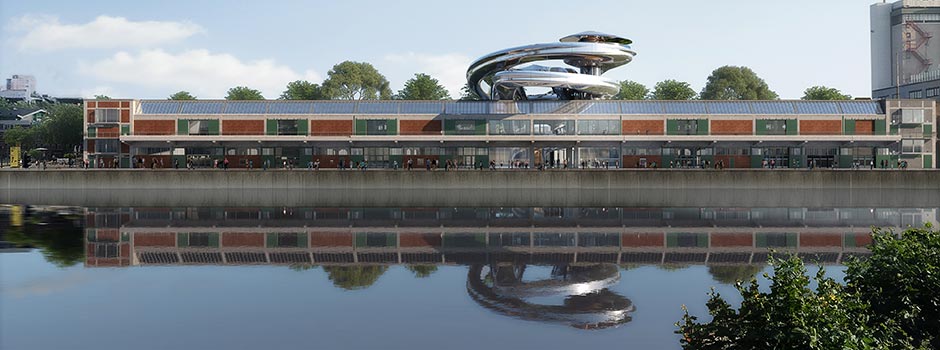
ARCHITECTURE Major New Migration Museum to open in Rotterdam in 2025
Nov 14, 2023 FEATURE, Architecture

The 16,000 sqm building, dating from 1923, was once part of the largest warehouse in the world. Located on the south bank of the River Maas in Rotterdam’s historic port district, the warehouse served as an important building for storage and shipping for the Holland-America Line - a Dutch cargo and passenger line. The Holland-America Line facilitated the journeys of millions of migrants in the 19th and 20th centuries who arrived and departed from the surrounding docks.
The building is being transformed by Ma Yansong of MAD Architects, the internationally acclaimed Beijing-based architecture practice. Visitors will immediately see its architectural masterpiece, the Tornado, an organic, dynamic structure evocative of rising air that climbs from the ground floor and flows up and out of the rooftop onto a platform hovering above the city – an uplifting symbol for the journeys experienced by migrants globally. Climbing the stairs of the Tornado will offer an exhilarating new perspective on the city of Rotterdam, with dramatic views across the River Maas and of Hotel New York, the former headquarters of the Holland-America Line.
The building has been restored with consultation by Bureau Polderman.
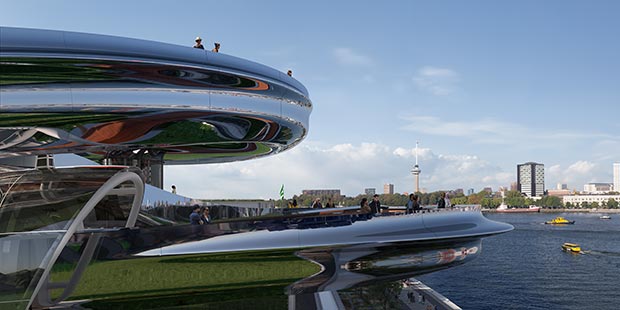 The Tornado at FENIX. Artist impression. Designed by MAD Architects / © MAD Architects
The Tornado at FENIX. Artist impression. Designed by MAD Architects / © MAD Architects
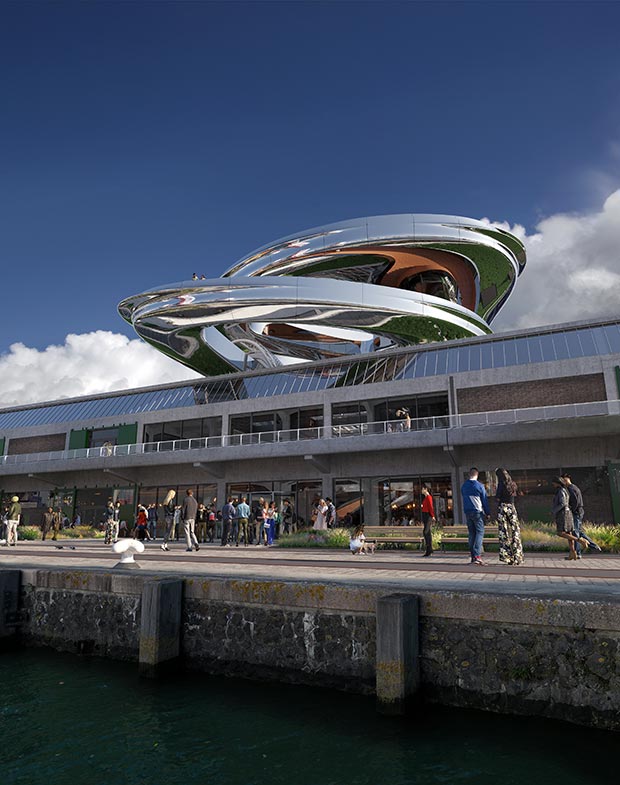 First sketch for FENIX by Ma Yansong, MAD Architects, 2018 / © MAD Architects
First sketch for FENIX by Ma Yansong, MAD Architects, 2018 / © MAD Architects
 The Tornado at FENIX. Artist impression. Designed by MAD Architects / © MAD Architects
The Tornado at FENIX. Artist impression. Designed by MAD Architects / © MAD Architects
FENIX explores the timeless story of human migration in a changing world through a series of encounters with art, architecture, photography, and history, setting out to redefine the role of a museum for the next generation.
Inside the building will be a series of vast gallery spaces over two floors, housing the museum’s growing art and historical collection as well as a series of commissions by emerging artists from across the world, telling stories of migration from their perspective. These include Paris-based Beya Gille Gacha, Rotterdam-based artist Efrat Zehavi, Korean artist Chae Eun Rhee, artist Raquel Van Haver, and US-based Hugo McCloud.
Over 200 acquisitions have already been made which examine the theme of migration through the lens of contemporary art, including Bill Viola’s Ancestors and work by contemporary artists such as Francis Alys, Steve McQueen, Grayson Perry, Rineke Dijkstra, Kimsooja, Shilpa Gupta, Jeremy Deller, and Danh Vo.
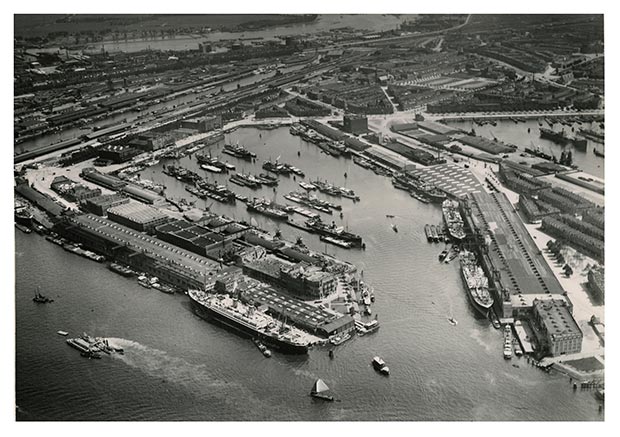 Aerial shot from the Rijnhavenand Wilhelminakadeshowing the buildings of the Holland-America Line. On the right side a part of the Maashaven. San Francisco Warehouse is in the lower right corner. 1939. Made by KLM Aerocarto. Rotterdam City Archives
Aerial shot from the Rijnhavenand Wilhelminakadeshowing the buildings of the Holland-America Line. On the right side a part of the Maashaven. San Francisco Warehouse is in the lower right corner. 1939. Made by KLM Aerocarto. Rotterdam City Archives
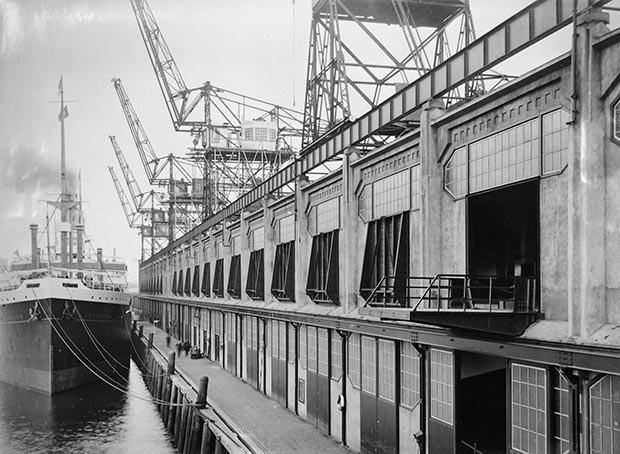 A ship docked at the San Francisco Warehouse. Around 1925.Collection Stadsarchief Rotterdam Municipal Archives, Rotterdam
A ship docked at the San Francisco Warehouse. Around 1925.Collection Stadsarchief Rotterdam Municipal Archives, Rotterdam
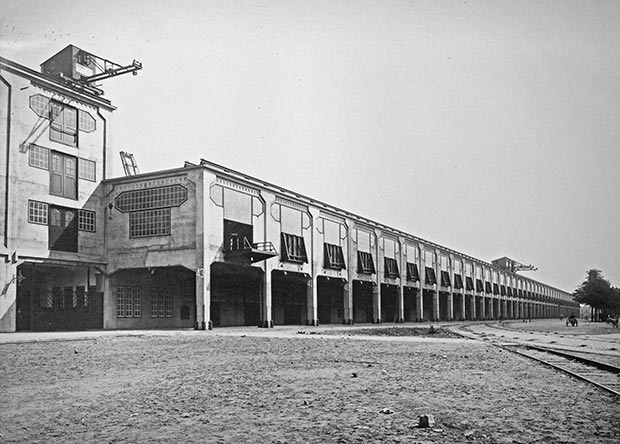 San Francisco Warehouse, 1925. Collection Stadsarchief Rotterdam Municipal Archives, Rotterdam
San Francisco Warehouse, 1925. Collection Stadsarchief Rotterdam Municipal Archives, Rotterdam
The ground floor will house three keynote projects:
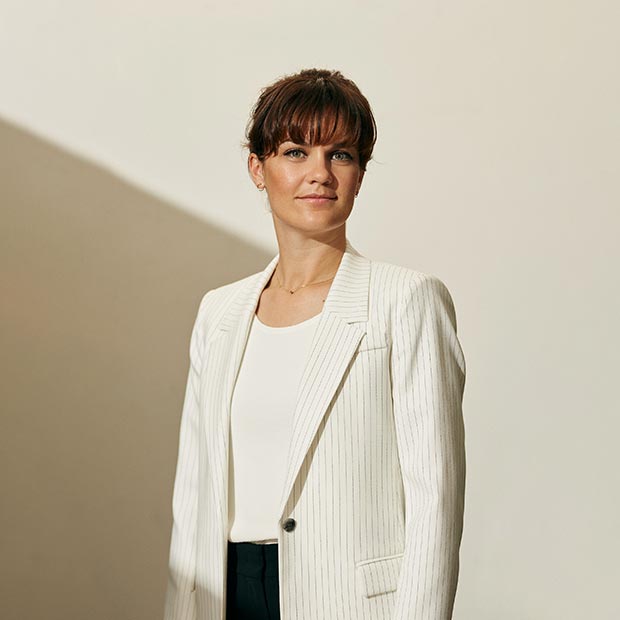 Director of FENIX Anne Kremers, c. Mounir Raji
Director of FENIX Anne Kremers, c. Mounir Raji
In the words of the Director, Anne Kremers: “FENIX’s story is Rotterdam’s. And its story is the world’s: one of arrivals and departures, and of constant change to face the future. In its landmark new home, FENIX will inspire a profound new curiosity about the world we live in.”
Ma Yansong, Founder & Principal Partner, MAD Architects: “When MAD Architects were asked to work on FENIX, we knew we had to create a dialogue with the existing building and its surroundings – and with a past containing so many stories of migration, memories, and uncertainty. In designing a new structure, we had to show this dialogue between the future and the past, and so continue the story of the building. The Tornado is all about the future, but it’s rooted in the past. For me, it’s a metaphor for the journeys of migrants who passed through this building.”
Between 2013 and 2017, Anne Kremers (b.1989) led the Museum Villa Mondriaan in Winterswijk in the Eastern Netherlands, appointed at the age of 24, the youngest museum director in the Netherlands at that time. Between 2017 and 2020 she worked for the Chow Tai Fook Art Foundation, designing innovative art and design projects in Hong Kong.
FENIX is funded by the Droom en Daad Foundation, founded in 2016 and led by Wim Pijbes, former Director of the Rijksmuseum. The Droom en Daad Foundation is helping redefine Rotterdam for the 21st century - developing new kinds of arts and cultural institutions and fostering new creative talent that reflects the city’s diversity, its spirit and its history.
Comments
Add a comment
Commenting is not available in this section entry.